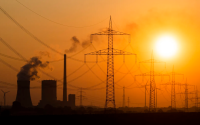The Ecologistby Lutz C. Kleveman
‘No blood for oil’ was a common slogan at the recent anti-war demos around the globe. Yet, few people have an idea of just how momentous a strategic struggle is being waged behind the rhetoric of weapons inspections and human rights. What is at stake is nothing less than who controls the earth’s remaining energy reserves. This new ‘Great Game’ (a modern variant of the imperial rivalry between Great Britain and Tsarist Russia in 19th century Central Asia) over oil is about to enter a crucial stage. However vehement the denials by the Bush administration, Washington’s true intention is to turn Iraq into an alternative to Saudi Arabia: a strategic oil supplier for its economy and a key US ally in the Middle East. The new Great Game is being played out not only in the Middle East but also in other energy-rich regions such as West Africa and the Caspian Sea. There too, the scramble for petrol reserves and pipeline routes is producing bloody conflicts, proving beyond doubt why oil has been called ‘the tears of the devil’. Iraq, however, has become the linchpin in a US strategy to secure cheap oil while breaking the clout of the Arab-dominated oil cartel Opec. Iraq sits on an astronomic 112 billion barrels of crude. At 12 per cent of the world’s reserves, this is the second largest proven source in the world. Only Saudi Arabia (with 262 billion barrels and roughly one fourth of the earth’s total resources) has more oil. At the moment, Iraq legally exports about two million barrels a day as part of the UN ‘food for oil’ programme. Most of its oil production facilities are in dire need of technical modernisation, but the UN sanctions keep foreign investors out. If sanctions were lifted after the overthrow of Saddam Hussein, trans-national energy corporations could start exploiting Iraq’s huge oil fields. There would be no shortage of suitors: Iraq’s light, low-sulphur oil is considered to be among the best in the world. Moreover, the fact that the country’s oil reserves often lie right under the earth’s surface makes it extremely cheap to drill. Production costs in Iraq can be as low as $2 a barrel. With the help of $20 billion of investment in new and existing facilities, Iraqi oil output could soar within a few years to seven million barrels a day. That would be roughly a 10th of global consumption. Abundant supply would lead to a price drop, which is just what lagging Western economies need. Last September George W Bush’s former economic adviser Larry Lindsey put the war aim bluntly, when he said: ‘When there is a regime change in Iraq, you could add three to five million barrels of production to world supply [per day]. The successful prosecution of the war would be good for the economy.’ Americans currently burn 21 million barrels of oil a day, roughly half of which is imported. As the country's domestic crude production is going to fall by an estimated 12 per cent over the next decade, imports will have to provide for two thirds of its total energy demand in 2020. To secure oil supplies for the US’s wasteful way of life, vice-president Dick Cheney’s 2001 National Energy Policy report recommended that ‘the President make energy security a priority of our trade and foreign policy.’ It also advocated global engagement in resource-rich regions ‘that will have a major impact on the global energy balance.’ Though this meant regions such as the Caspian; as well, by any count, the Gulf’s oil producers will remain central to world oil security and a primary focus of US international energy policy. The Saudi ‘threat’ Since the 1973 oil crisis, Opec has used oil as a pawn to gain leverage over the West. In a bid to decrease its dependency on the sheikhs, the US has sought for years to ‘diversify its oil supplies’. The problem is that many non-Opec oil fields, such as those in the North Sea, are approaching depletion. At the same time, the International Energy Agency estimates that booming economic growth in countries like China and India is likely to cause a surge in global oil consumption from today’s 73 million barrels per day to 90 million in 2020. Inevitably, Opec will expand its share of the world market to more than 60 per cent – thus enhancing its political clout. The influence of the Saudi petrol sheikhs will grow especially. Already, the US imports about 2.6 million barrels of oil from Saudi Arabia every day. The scale of its reserves puts the desert kingdom in a unique position to dictate prices to the West; it is the only country in the world capable of acting as a so-called ‘swing supplier’. To compensate for production losses like those caused by the current crisis in Venezuela, the Saudis are capable of boosting production from eight to 10.5 million barrels per day. Alternatively, if a price hike is in their interest, they can choose not to act at all. Many people in Washington are far from comfortable with the Saudis’ power. The country is turning out to be an embarrassing, and perhaps even dangerous, ally. Nearly all the hijackers on September 11 were Saudis, and there is a growing risk that radical Islamist groups could topple the corrupt Saud dynasty and stop the flow of oil to Western ‘infidels’. Yet even without an anti-Western revolution such as the one in Iran in 1979 (when 5.6 million barrels of crude disappeared from the world market overnight) Saudi petrol is already ideologically tainted. In an effort to stave off political turmoil the regime in Riyadh funds the radical Sunni sect of the Wahhabis, who themselves backed the Afghan Taliban and foment terror against Americans around the world. The Wahhabis also pose a danger to the thousands of US troops stationed in the Gulf following the first US-led campaign against Saddam 12 years ago. At an estimated cost of $50 billion a year, the US forces serve essentially to protect Saudi oil wells against internal threats and Iraqi aggression. This military presence on what is holy soil for Muslims has backfired terribly. No other cause has done more to motivate al-Qaeda to wage jihad against the US. As long as the US needs Saudi oil and cooperation in a war against Iraq, officials in Washington protest their interest in maintaining good relations with Riyadh. However, a growing number of influential politicians are openly suggesting taking the war on terror to Saudi Arabia and occupying its oilfields. Washington, meanwhile, has begun to look for a new ally and main oil supplier in the Middle East. This is where Iraq fits in. It is the only possible alternative as a swing supplier. It is not unlikely that a US-backed government in Baghdad would pull Iraq out of Opec lest foreign investors would be burdened by production limits. In that case, Iraq would serve as an Opec-buster. As one of a block of non-Opec producers – including Russia and the Caspian countries – it would churn out enough oil to undermine the cartel’s high-price agreements. The clout of Opec and Saudi Arabia would be broken, and oil would once again flow freely to the West. US corporates to carve up Iraq’s oil? Oil corporations are currently jockeying for the best deals in a post-Saddam Iraq. So, do the US war plans aim merely to open up Iraq for lucrative investments by US oil companies? Prima facie, there is plenty of circumstantial evidence for this view: the close connections between the Bush administration and big oil are well documented, for example. It is not difficult to imagine that a regime installed in Baghdad by US forces would favour US firms in the allotment of drilling concessions. Ahmed Chalabi, the leader of the dubious CIA-backed opposition movement the Iraqi National Congress, has already met with managers of ExxonMobil and ChevronTexaco. Talking to The Washington Post, Chalabi said: ‘US companies will get a big shot at Iraqi oil.’ This blatant favouritism worries BP, which pioneered the discovery of petrol in Iraq in the early 20th century. BP head Lord Browne speculated that if the Blair government did not actively support regime change in Iraq, British oil companies would lose out to their US competitors. Russian oil companies, likewise, have a lot to lose in Iraq. In 1997 Russian oil giant Lukoil signed a contract with Saddam to develop Iraq’s giant West Qurna oilfield. The $20 billion deal is of significant diplomatic importance. Upset about Moscow’s support for UN resolution 1441, Baghdad unilaterally cancelled the contract in December. But a Russian delegation of diplomats and oil barons was hastily dispatched to Iraq, and managed to mend fences and change the dictator’s mind. And Chinese and French energy corporations have also been active in Iraq for years. In the 1990s, TotalFinaElf made preliminary agreements with Baghdad to develop the oilfields of Majnoon and Nahr Umar in southern Iraq. Moscow and Paris fear that a new Iraqi government indebted to Washington would declare the old regime’s contracts null and void, and offer them to US firms. Behind-closed-doors, therefore, US diplomacy has sought to assure the Russians and the French that their contracts would be honoured. It is, however, in no way certain that a post-Hussein government, keen to establish nationalist credentials with the Iraqi people, would necessarily privatise the state-owned oil industry. However, the rivalry between oil corporations per se plays a less significant role in the Iraq crisis than supporters of a narrow business-centred ‘blood for oil’ theory contend. While the ties between Bush and the US oil industry are intimate, the US president would be unlikely to launch such a massive and costly military campaign merely to obtain a few juicy contracts for his Texan pals. Instead, wider strategic considerations are the key to understanding the decision makers in Washington – as well as those in Moscow and Bejing. This is particularly true for Russia. To be sure, Putin’s opposition to US war plans in Iraq also represents a diplomatic attempt to prevent the US from emerging as the unchallenged hegemonic power in the Middle East. However, his government’s stance is mainly about preventing a war that could erode its main source of income: the Siberian oil and gas industry. The Russians fear that after a regime change in Baghdad, Iraqi oil might flood the world market causing prices to drop. As a result of enormous effort over the past three years, Russia has boosted its crude output to eight million barrels a day. Its pipeline network is pumping at full capacity, with preparations underway to build a new giant pipeline to the Arctic port of Murmansk. The Russian state budget is financed almost entirely through revenues from raw materials exports. No other economic sector is as important in the former communist empire, which today struggles to keep up with Belgium in industrial performance. Russia’s problem is that all state expenditure has been calculated in expectation of an oil price of $23 per barrel. Describing the effects of Iraqi oil flooding the market, Aleksej Arbatov, deputy chairman of the defence committee of the Duma (Russia’s lower house of parliament), says: ‘Our budget would collapse.’ Production costs in faraway Siberia can reach up to $13 a barrel. If profits were to collapse, foreign corporations, whose capital Russia is trying to attract, might find a re-opened Iraq a far more attractive option. The Kremlin has, therefore, taken an anti-war course. ‘We are going to vote against any second resolution at the UN Security Council that enables the US to attack Iraq,’ a high-ranking Russian diplomat in the Near East told The Ecologist. ‘We simply cannot afford the potential consequences of a war for our petrol industry.’ US diplomacy will seek to sway the Russians through overall economic incentives. US and Russian officials have already discussed the concept of an ‘energy partnership’ in which Russian oil giants Lukoil and Yukos would directly deliver their Siberian oil to the US. The battle for the Caspian But decision makers in Moscow have become suspicious. They are still waiting for the lifting of trade restrictions promised by the US in return for Russia’s acceptance of the stationing of US troops in ex-Soviet Afghanistan. Conservatives in Moscow, in particular, have come to suspect that the US is not so much after terrorists in Central Asia but the fabulous energy reserves of the Caspian Sea. While some estimates have been exaggerated, the US Department of Energy predicts the region sits on a vast 200 billion barrels of crude oil. This has turned the Caspian into a crucial battleground in the new Great Game, where the US and Britain compete with Russia and regional countries over access to its ‘black gold’. Western multinationals have invested tens of billions into new production facilities in the region. But there is a problem: Caspian oil and gas is worthless until moved. The region is landlocked and the oil lies thousands of miles from any high-sea port from where it could be shippped to the markets of the industrialised world. Pipelines need to be built. For 10 years, however, their disputed routes have caused bloody conflicts around the Caspian Sea, in the Caucasus and Central Asia. There is no end in sight. Russia, still regarding itself as imperial overlord of its former colonies, is trying to hold the US at arm’s length. The world’s second biggest oil exporter after Saudi Arabia insists the Caspian pipelines should be built, as in Soviet times, across Russian territory north of the Caucasus mountains to the Black Sea port of Novorossijsk. This would give Moscow considerable political and economic power over the newly independent states. For their part, the US and Britain are trying to keep the Caspian’s precious oil beyond Russia’s reach. Keen to strengthen the former Soviet republics’ independence from Moscow, the US has championed a pipeline that would circumvent Russia. But Washington also adamantly objects to a southern route through Iran – its arch-enemy for over 20 years. Thus, in the mid-1990s the US government supported plans by the US oil company Unocal to build oil and gas pipelines from Turkmenistan through Afghanistan to the Indian Ocean. When it became clear in 1998 that the Taliban supported anti-US terrorists, the pipeline plans for Afghanistan were temporarily shelved. Now the US-led so-called ‘anti-terrorist’ campaign in Afghanistan has reopened the Herat-Kandahar corridor, these plans have been dusted off. As an alternative, Washington has put its weight behind another gigantic project: a pipeline that would run over 1,000 miles from Azerbaijan’s capital Baku, via neighbouring Georgia all the way to Turkey’s Mediterranean port of Ceyhan. An international consortium led by BP started construction on the project last autumn. In a bid to deter investors, Moscow has responded by continuing to politically destabilise the war-torn Caucasus. To rein in Russian influence in the region, the US has used the Afghan war for a massive military build-up in three ex-Soviet Central Asian republics. Hence, war in Iraq may just be a beginning, with the stage already set for future oil wars. More oil wars ahead As long as there is no end in sight to the age of fossil fuels, and the industrialised world’s dependency on Middle Eastern oil continues to grow unabated, conflicts are likely to break out which are essentially about securing the earth’s remaining energy reserves. To be sure, the planet’s crude oil resources are going to last for a few more decades yet. However, the struggles over access and profits between countries and multinational corporations are already becoming fiercer. Similar battles are being waged internally, within the societies of oil-rich countries. In most of these countries – Nigeria, Venezuela, Angola and the Arab sheikhdoms for example – sudden oil wealth has led to corruption, economic decline, political oppression, revolutions and civil war. ‘We are drowning in the excrement of the Devil,’ the Venezuelan Opec founding father Juan Alfonzo once said of the oil boom’s dire consequences. More often than not ‘liquid gold’ turns out to be a curse rather than a blessing. The repercussions of energy imperialism and wars over raw materials will be felt in the West in the shape of floods of refugees and oil-price shocks. These will force the West to further increase costly overseas military commitments. In the long run, however, the vulnerability of oil infrastructure in volatile regions makes it virtually impossible to secure energy supply purely by military means. Political leaders would be well advised, therefore, to dilute our nefarious dependence on petrol through the promotion of renewable energy technologies. The task of protecting the climate against the greenhouse effect urgently requires these steps anyway. The events in Iraq and around the Caspian Sea demonstrate how a truly new energy policy – irrespective of its obvious ecological advantages – would also be a foresighted security policy. Lutz Kleveman is New York correspondent for the German news magazine Der Spiegel (Online). He has also worked as a conflict zone reporter for The Daily Telegraph. The New Great Game, his book on the struggle for oil in Central Asia, is published by Atlantic Books in August. Drop Boxes: 1. James Woolsey, CIA Director from 1993 to 1995, and US Senator Richard G Lugar: ‘ Oil is a magnet for conflict. The problem is simple: everyone needs energy, but the sources of the world’s transportation fuel are concentrated in relatively few countries. Well over two thirds of the world’s remaining oil reserves lie in the Middle East (including the Caspian basin), leaving the rest of the world dependent on the region’s collection of predators and vulnerable autocrats. This unwelcome dependence keeps US military forces tied to the Persian Gulf, forces foreign policy compromises, and sinks many developing nations into staggering debt as they struggle to pay for expensive dollar-denominated oil with lower-priced commodities and agricultural products. In addition, oil causes environmental conflict. The possibility that greenhouse gases will lead to catastrophic climate change is substantially increased by the 40 million barrels of oil burned every day by vehicles. ’ Source: Foreign Affairs Jan/Feb 1999 2. THE US QUEST FOR OIL: STRENGTHENING AL_QAEDA The massive presence of US forces in Saudi Arabia after the 1991 Gulf War helped give rise to al-Qaeda. Bin Laden was outraged at the sight of thousands of ‘infidels’ stationed on Islam’s holy soil, and accused the US of forcibly keeping the oil barrel price down and ‘the biggest oil theft in history’. Many Middle East experts fear a war in Iraq could lead to the very regional instability it is purported to prevent. Few Arabs in Iraq's neighbouring countries like the dictator in Baghdad, but most would resent US military action as yet another attack on Muslims and an imperialist bid to control the region's oil reserves. Furious at their own despotic leaders' cooperation with the US, radical Islamic groups and the Arab populations of Egypt, Jordan and Saudi Arabia could rise in revolt, overthrow their regimes and stop the flow of oil to the West. A war against a Muslim country would further fill the ranks of al-Qaeda in the region. In February, a tape (widely believed to be authentic) was released in which bin Laden appeared to call upon ‘his brothers’ to defend Iraq. In southern Afghanistan Al-Qaeda and Taliban fighters are already joining forces with warlord Gulbuddin Hekmatyar and his mujaheddin. They have repeatedly engaged US forces in intense fighting. To do so, they cross the border from their hiding places in Pakistan's Pashtun tribal areas, where elections recently swept Taliban-style Islamists to power. Anti-Americanism in the region has reached unprecedented and explosive levels. By going to war, Bush risks seeing his formal allies of Pakistan and Afghanistan blow up in his face. 3. By any Means (Or Cost) Necessary Steve Kretzman shows just how much the US is willing to spend to protect its oil Reacting to the Soviet invasion of Afghanistan, the Iranian revolution and the lingering fear generated by the Arab oil embargo of 1973, then US president Jimmy Carter first specifically articulated the Persian Gulf as a ‘vital interest’ of the US in January 1980. Laying out what is now known as the ‘Carter doctrine’, he pledged to ‘defend’ the Persian Gulf by ‘any means necessary – including military force’. That commitment has been costly. Five weeks after Carter’s speech, the US Rapid Deployment Joint Task Force (RDJTF) was formally established at MacDill Air Force Base, Florida. By the time Ronald Reagan took office, the RDJTF comprised 100,000 army troops, 50,000 marines, and additional air force and navy personnel. In January 1983, RDJTF became US Central Command (USCENTCOM), which 20 years later is overseeing the build-up of US troops around Iraq. Estimates of the costs associated with ensuring ‘access’ to Persian Gulf oil supplies run as high as $90 billion a year. A survey by the US Department of Energy’s Oak Ridge National Laboratory of the various governmental and independent studies on the topic from 1990 to 1996 came up with an average annual cost of $32 billion. Speaking at a conference in Whitehall last year, British Cabinet minister Peter Hain said: ‘Paid predominantly by the US, the costs of protecting our Middle East oil supplies are as high as $15-25 a barrel.’ Organisation for Economic Cooperation and Development (OECD) nations together import about 10 million barrels per day from the Persian Gulf. Hain’s estimate puts the cost of defending those imports at between $54 billion and $91 billion annually. The cost of waging war to guarantee oil supplies from the Persian Gulf is also high. The financial cost of the first Gulf War of 1991 is estimated at between $60 billion and $80 billion. The American Academy of Arts and Sciences forecasts that the cost of a second US-led Gulf war is likely to fall between $121 billion and $1.2 trillion. Two decades after USCENTCOM was established, the US military is clearly positioning itself to assert the Carter doctrine on a global scale. In the Caspian region, Georgian president Eduard Schevardnadze has noted that ‘the prospect of using the US military to guard transportation routes for the Caspian’s energy resources to the world markets is quite realistic.’ Georgia recently received $64m worth of US military assistance. Neighbouring Azerbaijan and Turkey also benefit handsomely from US military largesse. In Colombia, the Bush administration’s decision to allocate $98m to train a ‘Critical Infrastructure Brigade’ of Colombians for the explicit purpose of protecting Occidental Petroleum infrastructure fuels the idea that US involvement in the region (including neighbouring Venezuela) is all about oil. Similarly, in West Africa, which could soon supply 25 per cent of US oil imports, credible rumours are swirling regarding the establishment of a US military base in Sao Tome. Testifying before the US Congress recently, former CIA director James Woolsey spoke out strongly in favour of alternative energy technology, noting that ‘there is no incompatibility between being a hawk and being a green’. While that may be true, it’s hard to imagine that a society fuelled by hydrogen fuel cells and solar power would perceive vital national interest in the Persian Gulf or a half dozen other places around the world. If the energy is limitless, the supply will always be secure. Steve Kretzman, an oil analyst with the Institute for Policy Studies think-tank in Washington DC, is co-author of a forthcoming report on the military costs associated with oil globally.






